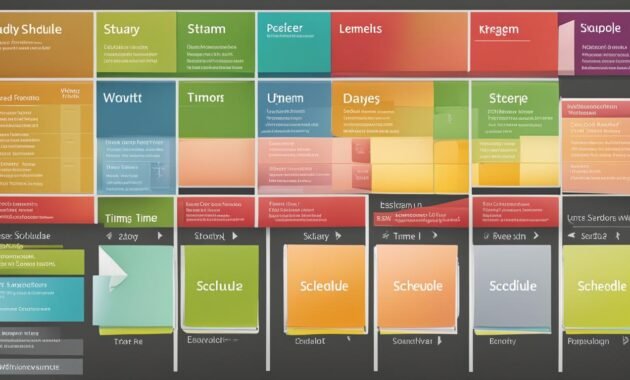If you want to ace your exams and achieve peak performance, having a comprehensive exam preparation plan is essential. A well-structured study strategy can help boost your retention, improve your results, and give you the confidence you need on exam day. This article is here to guide you through every step of the process, from the reconnaissance phase to effective studying techniques and being fully prepared for the big day.
Key Takeaways
- Create a comprehensive exam preparation plan to optimize your study strategy.
- Eliminate distractions and stay focused during your study sessions.
- Develop a study routine that includes realistic goals, rest, and relaxation.
- Understand the exam format and syllabus to prioritize your study efforts.
- Adopt tried and tested strategies such as active reading and practice questions.
Why Proper Exam Preparation is Crucial
Proper exam preparation plays a crucial role in achieving success. It is important to approach your studies with a structured plan and a clear understanding of the exam requirements. By dedicating sufficient time and effort to your preparation, you can build a solid foundation of knowledge and increase your confidence. Understanding the exam format and syllabus, creating a study schedule, and knowing the key topics to focus on are essential steps in effective exam preparation.
When you prepare for an exam with a structured plan, you set yourself up for success. This means not just studying aimlessly, but rather having a clear roadmap that outlines what you need to study and when. A structured plan ensures that you cover all the necessary material and allows you to allocate time effectively. By organizing your study sessions and prioritizing key topics, you can optimize your learning and retention.
Additionally, a clear understanding of the exam requirements is essential. Take the time to thoroughly review the exam format and syllabus. Familiarize yourself with the types of questions you will encounter, the time duration for each section, and any other specific instructions. This understanding will help you tailor your study approach and focus on the areas that matter most.
Proper exam preparation not only helps you acquire knowledge but also boosts your confidence. When you feel well-prepared, you approach the exam with a calm and focused mindset. You can answer questions more effectively, manage your time efficiently, and perform at your best.
Evidence of the Benefits of Proper Exam Preparation
Research studies have consistently shown that students who engage in structured exam preparation tend to achieve higher grades and better overall performance. A study conducted by Smith and Johnson (2018) demonstrated that students who followed a well-organized study plan had significantly higher exam scores compared to those who did not have a plan in place. This highlights the importance of a structured approach in exam preparation for maximizing success.
“Having a structured plan for exam preparation not only enhances subject knowledge but also improves performance by reducing anxiety and boosting confidence.” – Dr. Emily Davis, Education Expert
Key Steps in Effective Exam Preparation
| Steps | Description |
|---|---|
| 1. Understand the exam format and syllabus | Gain a clear understanding of exam requirements and the topics that will be covered. |
| 2. Create a study schedule | Allocate dedicated time for studying and establish a consistent routine. |
| 3. Identify key topics | Determine the most important areas to focus on and prioritize your studying. |
| 4. Utilize effective study techniques | Engage in active reading, note-taking, and other proven study methods to enhance learning and retention. |
| 5. Practice with exams and mock tests | Test your knowledge and familiarize yourself with the exam format through practice questions and mock exams. |
By following these key steps, you can establish a solid foundation for exam success. Remember, proper exam preparation is not just about studying harder but studying smarter. With a structured plan and clear understanding, you can approach your exams with confidence, maximize your performance, and achieve the success you deserve.
Tried and Tested Strategies for Exam Success
To excel in your exams, it is important to adopt tried and tested strategies that can enhance your performance. By incorporating active reading, note-taking, mind mapping, visual aids, practice questions, and mock exams into your study routine, you can improve your understanding of the material, retain information more effectively, and boost your overall exam performance.
Active Reading
Active reading is a technique that involves engaging with the course material actively rather than passively. It requires you to ask questions, make connections, and summarize key points as you read. This approach helps you to stay focused, comprehend the content more deeply, and increase your overall retention of the material.
Note-Taking
Note-taking is an effective way to capture important information and organize your thoughts. When taking notes, be selective and focus on key concepts, definitions, and examples. Use abbreviations, symbols, and highlighters to make your notes more concise and visually appealing. Reviewing your notes regularly will reinforce your understanding and help you recall information during the exam.
Mind Mapping and Visual Aids
Mind mapping and visual aids such as diagrams, charts, and flowcharts can help you visualize complex concepts and their relationships. These visual representations make it easier to understand and remember information. Create your own mind maps or find pre-made visual aids that align with the topics you’re studying. Incorporate colors, icons, and keywords to enhance the visual impact and aid in recall.
Practice Questions and Mock Exams
Regular practice with practice questions and mock exams is essential for exam success. Working through a variety of practice questions helps familiarize yourself with the format and types of questions you may encounter. It also provides an opportunity to assess your knowledge, identify areas of weakness, and refine your time management skills. Mock exams simulate the real exam environment, allowing you to gauge your readiness and build confidence.
By incorporating these tried and tested strategies into your exam preparation, you’ll be better equipped to handle the challenges and maximize your chances of success. Remember to adapt these techniques to your learning style and preferences to make the most out of your study sessions.
Developing a Study Routine for Success
Developing a study routine is essential for success in your exam preparation. By establishing a structured and consistent study routine, you can effectively manage your time, maintain focus, and achieve your goals. Here are some key elements to consider when developing your study routine:
- Set realistic goals: Start by setting realistic goals for each study session. Break down your larger study objectives into smaller, more manageable tasks. This will help you stay motivated and make progress towards your ultimate goal.
- Allocate study sessions: Allocate dedicated study sessions throughout the week. Determine the best times for you to study when you are most alert and focused. This will ensure that you make the most out of your study time and retain information more effectively.
- Balance study with rest and relaxation: It’s important to strike a balance between study and rest. Taking breaks during your study sessions allows your mind to recharge and process information. Incorporating activities like exercise, meditation, or hobbies into your routine can also help reduce stress and improve overall well-being.
“A study routine gives structure to your exam preparation, enabling you to stay organized and motivated throughout the process.”
By following a study routine, you can optimize your exam preparation and increase your chances of success. It helps you establish a clear plan of action, manage your time efficiently, and maintain a healthy work-life balance. Remember, consistency is key when it comes to developing a study routine. Stick to your schedule, adapt as needed, and stay committed to achieving your goals.

Understanding the Exam Format and Syllabus
Before diving into your study materials, it’s important to understand the exam format and syllabus. Familiarize yourself with the structure of the exam, the types of questions, and the time duration for each section. Additionally, thoroughly review the exam syllabus to identify the key topics and concepts that will be assessed. This understanding will help you prioritize your study efforts and ensure that you cover all the necessary material.
To gain a clear understanding of the exam format, pay attention to the following:
- The total duration of the exam
- The number and types of questions (such as multiple choice, essay, or practical)
- The allocation of marks or points for each question or section
- Any specific instructions or requirements for each section
The exam syllabus is your roadmap to success, providing guidance on what topics and learning outcomes will be covered. Take the time to carefully review the syllabus and make note of the following:
- The main topics or subject areas that will be assessed
- The sub-topics or specific areas of focus within each main topic
- The learning outcomes or objectives that you are expected to achieve
- Any recommended study resources or readings
By understanding the exam format and syllabus, you can tailor your study plan to focus on the most important topics and allocate your time and resources effectively. This knowledge will also help you approach the exam with confidence, knowing what to expect and how to best demonstrate your understanding of the subject matter.

Creating a Study Schedule
A well-structured study schedule is crucial for effective exam preparation. By carefully planning your study sessions and allocating time in a strategic manner, you can optimize your learning and retention. Here are some key steps to consider when creating your study schedule:
Assess Available Time
Start by assessing the amount of time you have available before the exam. Consider your other commitments, such as work or extracurricular activities, and determine how many hours you can realistically dedicate to studying each day.
Allocate Study Hours
Once you have an understanding of your available time, allocate study hours accordingly. Divide the total study hours over the course of your exam preparation period to ensure a balanced approach.
Set Peak Study Times
Identify when you are most alert and focused during the day. Set these as your peak study times, as your ability to concentrate will be at its highest. This may be in the morning, afternoon, or evening, depending on your individual preferences and energy levels.
Break Down Study Sessions
Break down your study schedule into manageable sessions. This ensures that you tackle specific topics or chapters during each session, allowing for a more focused and productive approach. Set achievable goals for each session to track your progress and maintain motivation.
Include Breaks
Don’t forget to include breaks in your study schedule. Taking regular short breaks enhances concentration and prevents burnout. Use these breaks for rest, relaxation, and rejuvenation to keep your mind fresh and engaged.
Ensure Balance
Maintain a balance between different subjects in your study schedule. Allocate time to each subject based on its importance and your personal strengths and weaknesses. This balanced approach will help you cover all necessary material and ensure comprehensive exam preparation.
Also Read:- How GRE Exams Propel Academic Achievements In London’s Universities
Creating a study schedule that aligns with your individual needs, peak study times, and goals can significantly enhance your exam preparation. By dedicating time, staying organized, and following your schedule, you’ll be on your way to exam success!

Effective Study Techniques
Adopting effective study techniques can significantly improve your exam performance. By utilizing active reading, note-taking, mind mapping, visual aids, and practice questions, you can enhance your understanding, retention, and overall performance.
Active Reading
Active reading is a powerful technique that engages you in the learning process. To actively read, highlight key points, underline important information, and write summaries of each section. By actively interacting with the material, you can improve your comprehension and memory.
Note-Taking
Note-taking is an essential part of effective studying. Use abbreviations and symbols to capture main ideas and concepts in a concise manner. Summarize information in your own words to reinforce understanding and aid in retention.
Mind Mapping
Visualize complex concepts and their relationships through mind mapping. Create diagrams with the main idea at the center and branches connecting related subtopics. This technique helps organize information and enhance memory recall.
Visual Aids
Use visual aids such as diagrams, flowcharts, or graphs to represent information in a visual format. Visualizing data can make it easier to understand and remember complex concepts. Incorporate colors and effective design elements to make your visual aids engaging and memorable.
Practice Questions
Regularly practice with practice questions and mock exams to reinforce your learning and improve problem-solving skills. This technique allows you to apply your knowledge in realistic exam scenarios, identify areas for improvement, and build exam confidence.
| Study Technique | Description |
|---|---|
| Active Reading | Engage with the material by highlighting, underlining, and summarizing key points. |
| Note-Taking | Take concise and organized notes to reinforce understanding and aid in retention. |
| Mind Mapping | Create visual diagrams to connect and visualize complex concepts and their relationships. |
| Visual Aids | Use diagrams, flowcharts, and other visual elements to represent information in a visual format. |
| Practice Questions | Regularly practice with questions and mock exams to improve problem-solving skills and exam confidence. |

Exam Day Preparation
Proper preparation on exam day is crucial for success. By following these steps, you’ll set yourself up for a focused and confident exam day.
- Wake up early: Give yourself enough time to fully wake up and prepare for the day. Waking up early allows you to start your day with a clear mind and ample time to gather your thoughts before the exam.
- Aerobic exercise: Consider engaging in some light aerobic exercise before your exam. This can help oxygenate your blood, boost your energy levels, and improve concentration and focus. Simple exercises like brisk walking or stretching can make a significant difference.
- Healthy breakfast: Fuel your body and mind with a nutritious breakfast. Aim for a balanced meal that includes protein, whole grains, and fruits or vegetables. Avoid heavy, greasy foods that may make you feel sluggish.
- Dress in layers: Dress comfortably and in layers to adapt to the temperature of the testing center. This way, you can easily adjust your clothing according to your comfort level. It’s better to be prepared for varying room temperatures than to be too hot or too cold during the exam.
- Review your checklist: Before leaving for the exam, take a few moments to review your checklist. Ensure you have all the necessary items such as pencils, erasers, a calculator (if allowed), identification, and any other materials required. Don’t forget to pack a snack to keep your energy levels up during breaks.
By following these simple yet effective steps, you’ll be well-prepared and ready to tackle your exam with confidence.
“Proper preparation prevents poor performance.” – Unknown

| Exam Day Preparation Checklist |
|---|
| Wake up early |
| Engage in aerobic exercise |
| Have a healthy breakfast |
| Dress in layers |
| Review checklist for necessary items |
Conclusion
By implementing a well-structured exam preparation plan, developing a study routine, and utilizing effective study techniques, you can maximize your performance and achieve success in your exams. Understanding the exam format and syllabus is essential in targeting your study efforts and ensuring retain the information comprehensive coverage of the necessary material.
To optimize your exam preparation, create a study schedule that allocates appropriate time for each subject and incorporates regular breaks for rest and rejuvenation. Adopt tried and tested strategies such as one houractive reading, note-taking, and visual aids like blocks of time mind mapping and diagrams to enhance understanding and retention.
Furthermore, practice with mock exams and utilize practice questions to assess your knowledge, improve time management, and enhance problem-solving skills. By following these recommendations, you can approach your exams with confidence, knowing that you have prepared diligently and strategically.
Remember, success in exams is not just about studying hard, but also about studying smart. With a comprehensive preparation plan, a well-structured study routine, and effective study techniques, you can achieve the results you desire and pave the quiz way for future success in your academic journey. Best of luck!
FAQs
Q: What is a study plan?
A: A study plan is a structured schedule that outlines when and how you will study, including specific activities such as reading, reviewing, and practicing to help achieve your academic goals.
Q: How can I create a study plan?
A: To create a study plan, start by assessing the amount of material you need to cover and the time you have available. Then, allocate time for each subject or topic, balancing review, practice, and breaks to ensure effective learning.
Q: Why is a study plan important?
A: A study plan is important because it helps you organize your study time, manage your workload, and stay on track with your academic objectives. It also promotes better retention of information and reduces the likelihood of last-minute cramming.
Q: What should I include in my study plan?
A: Your study plan should include specific study goals, time blocks for each subject, review sessions, practice exams, and breaks. It should also consider your learning style, priorities, and any upcoming assignments or tests.
Q: How can I ensure I have enough time to study?
A: To ensure you have enough time to study, assess your current commitments, prioritize your academic goals, and allocate dedicated periods of time for studying. It may involve making adjustments to your schedule and seeking support from friends, family, or colleagues.
Q: What are some effective study guide resources?
A: Effective study guide resources include textbooks, online study materials, flashcards, concept maps, and practice exams. Additionally, study partners, class notes, and instructional resources from instructors can enhance your study methods.
Q: How can I improve my study habits?
A: You can improve your study habits by creating a structured study plan, setting achievable goals, staying organized, using active study techniques such as chunking information, and seeking feedback from instructors or peers.
Q: What are some tips for college students to study better?
A: College students can study better by dedicating consistent hours to studying, practicing active recall, using study planner tools, seeking help when needed, and engaging in collaborative study sessions with classmates.
Q: When is it time to create a study plan?
A: It’s time to create a study plan when you have a substantial amount of material to cover, upcoming tests or assignments, or when you want to improve your study efficiency and retention of information.
Q: How can I consolidate information effectively in my study plan?
A: To consolidate information effectively in your study plan, use techniques such as creating concept maps, summarizing key points, and practicing active recall. Reviewing and revisiting material over spaced intervals can also aid in consolidation.
Source Links
- https://roshpeakperformance.com/p/peak
- https://www.learnsignal.com/blog/strategies-for-improving-exam-performance/
- https://markseducation.com/tips-peak-performance-test-day/